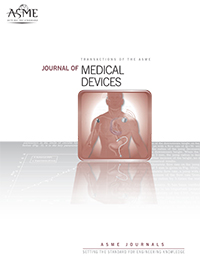Previous studies have shown that many S-nitrosothiols (RSNOs) rapidly degrade, with half-lives from minutes to seconds in aqueous solution [1]. The research presented in this paper presents data that the RSNO 1,3-benzenedinitrosothiol has been relatively stable for over 1 year. This RSNO still releases nitric oxide (NO) when subjected to ultraviolet light and has the same characteristic absorbance peak as a freshly made RSNO. Developing this stable RSNO potentially provides a venue for further investigation into using this NO donor to improve the biocompatibility of implanted optical sensors.
Issue Section:
2010 Design of Medical Devices Conference Abstracts
Copyright © 2010
by American Society of Mechanical Engineers












